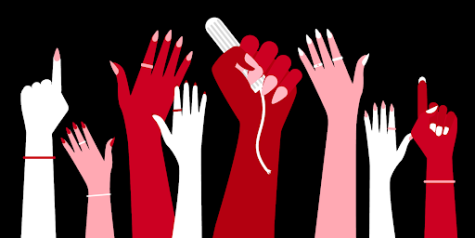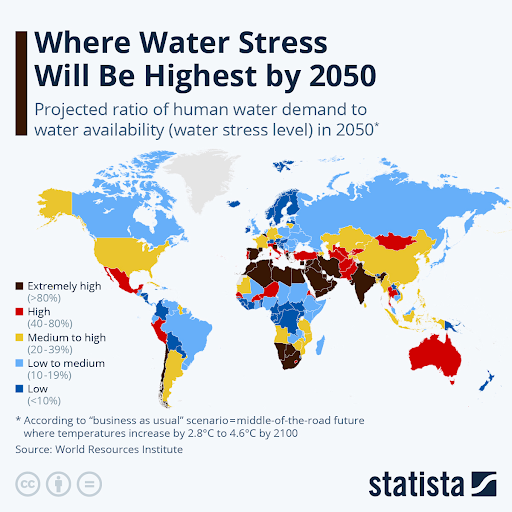When can we finally achieve period equity?
“I’m ashamed to talk about my period with male family members.”
 In today’s society, we learn about various events around the world through numerous social media platforms. These platforms vary from educating us about global issues to educating us about issues of offensive terminology. Period stigma is a topic that prevents menstruators from asking for help or even speaking up about this topic because of their unshakeable fear of the responses they may get. Unfortunately, sometimes, menstruators hear “ew”, “that’s so gross”, or a negative response that is detrimental to their mental health; however, this is, also, a factor that plays into period stigma.
In today’s society, we learn about various events around the world through numerous social media platforms. These platforms vary from educating us about global issues to educating us about issues of offensive terminology. Period stigma is a topic that prevents menstruators from asking for help or even speaking up about this topic because of their unshakeable fear of the responses they may get. Unfortunately, sometimes, menstruators hear “ew”, “that’s so gross”, or a negative response that is detrimental to their mental health; however, this is, also, a factor that plays into period stigma.
When people hear about periods, some often associate it with the phrase “that time of the month” and some often associate it with a period of bleeding. My friend comes from a religious background, and she tells me that, every month, her mother performs a “cleanse” on her whenever she menstruates. For her family, blood is seen as “dirty”. She states that it’s not only her family— many other families in her culture also associate periods with impurity and shame. It’s a topic that should not be discussed with male figures in her family. So, in many cases, sanitary products are given code names. To think that not only her family stigmatizes periods, but many other families too, is shocking.
It’s not just families who stigmatize periods, but also institutions. Institutions that give out free condoms, but not free menstruation products play into period stigma. When there are menstruation products provided, sometimes, you have to pay with coins. So, how is it that men can have free, protected sex, but menstruators have to pay to properly menstruate? While researching on ‘Google Scholar’, trying to find an article talking about how unfair the system is when it distributes free condoms more often than free menstruation products, we’ve seen periods get stigmatized. When we walk into our own doctor’s office we can get free condoms, but not free period products.
“In Kenya…Women face discrimination, harassment, and are looked down upon because of menstruation, as it is seen as a form of weakness rather than a necessary biological function” (Litman). “In Bangladesh, 67.1% of the sample [young girls] believed that menstrual blood was not impure while 32.9% of young girls were under the impression that their menstrual blood was impure” (Mostafa). In Hungary, “Women rarely dare to ask for help from social workers or professionals, such as teachers or doctors, as they are ashamed of both poverty and periods” (Rutai). In the Netherlands, “Almost half [of the women] said that they feel dirty while menstruating” (Singeling). In Turkey, “48.8% of them felt they had to keep their menstruation as a secret” (Çevirme et al.). Period stigma has caused harm to menstruators who unfortunately already suffer social discrimination in their own countries. Therefore, moving forward, having open discussions about menstruation, whether it’s questions or fears, is okay. To continue talking about this subject encourages menstruators to ask for help when they need it. Open discussions include having more thoughtful responses to someone who is menstruating and rather than providing negative responses, providing positive responses. These actions might seem minuscule, but lead us to a more judgment-free environment where people feel safe talking about their struggles with menstruation, period poverty, and the list goes on.
Sources:
- Litman, J. (2018, June 5). Menstruation stigma must stop. period. | The Public Health Advocate. Menstruation Stigma Must Stop. Period. Retrieved from https://pha.berkeley.edu/2018/06/05/menstruation-stigma-must-stop-period/
- Mostafa, Ila. “The Real Period Stain: Menstrual Stigma and Its Pressures in South Asia.” Augustana Digital Commons, https://digitalcommons.augustana.edu/celebrationoflearning/2019/presentations/3/?utm_source=digitalcommons.augustana.edu%2Fcelebrationoflearning%2F2019%2Fpresentations%2F3&utm_medium=PDF&utm_campaign=PDFCoverPages.
- Çevirme, Ayşe Sayan, et al. “The Perception of Menarche and Menstruation among Turkish Married Women: Attitudes, Experiences, and Behaviors.” Social Behavior and Personality: an International Journal, vol. 38, no. 3, 2010, pp. 381–393., https://doi.org/10.2224/sbp.2010.38.3.381.
- Singeling, Mascha. “One in Ten Dutch Girls Can’t Afford Tampons, Sanitary Pads.” NL Times, 20 Oct. 2020, https://nltimes.nl/2019/11/09/one-ten-dutch-girls-cant-afford-tampons-sanitary-pads.
- Rutai, Lili. “Reporting on Period Poverty in Hungary |.” | Amplifying Young Feminism Across Europe, 7 July 2020, https://www.youngfeminist.eu/2020/07/reporting-on-period-poverty-in-hungary/.
- Kosin, Julie. “Getting Your Period Is Still Oppressive in the United States.” Harper’s BAZAAR, November 2, 2021. https://www.harpersbazaar.com/culture/features/a10235656/menstrual-period-united-states/.




